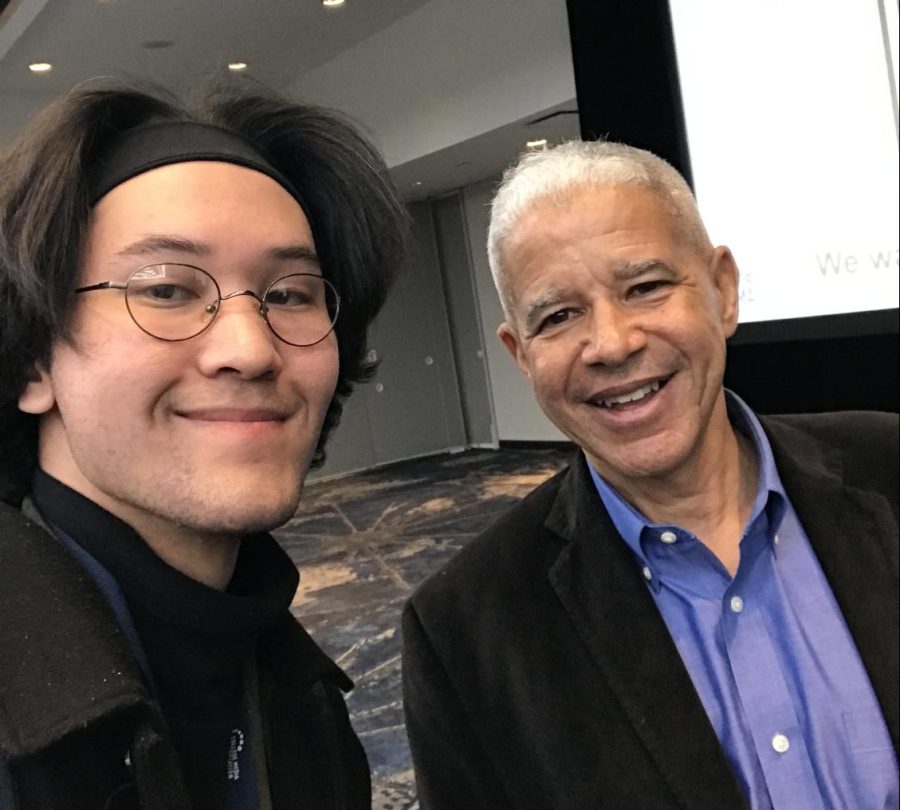![]() T.J. Politzer was born on Oct. 9, 1951 in Seattle, Washington. As the third son of an Austrian Holocaust survivor and an opera singer, a love for the arts was instilled
T.J. Politzer was born on Oct. 9, 1951 in Seattle, Washington. As the third son of an Austrian Holocaust survivor and an opera singer, a love for the arts was instilled
early on in his life.
His parents met at Columbia University. Both shared a commonality of speaking fluent German, and within three months of meeting, were married. The family moved to Seattle in 1949.
A year after his birth, Politzer’s father was offered a teaching position at Harvard, so the family picked up and moved to Boston. This would be the beginning of a life on the move. From Boston to Michigan and various countries in Europe, Politzer was able to experience growing up much more differently than most kids.
When he was 12 years old, his father was offered a teaching position at Stanford University. His family packed up and moved to Palo Alto, where they eventually settled. It was the move to California as well as being immersed in the then-popular folk music scene that would change his life forever.
When Politzer spoke, it was as if he was reminiscing about his childhood days. He spoke happily about classical music, Broadway and opera always playing in his home. He recalled a family piano where he sat for hours, teaching himself how to play.
At nine years old, he wanted to play the accordion and pleaded with his parents to buy him one. He was shot down by his parents, who thought—just as his older brothers did—he would eventually neglect the instrument.
His parents gave in after awhile, and decided to buy him a cheap guitar to compensate for the accordion.
Little did they know that this guitar would be the instrument to direct his life for the next 30 years.
In the 1960s, the folk music scene was emerging on the West Coast, and Politzer found himself in the middle of it all.
His first recollection of hearing the blues was in 1965, when his school friends offered him an extra ticket for the Berkeley Blues Festival.
It was at this festival that he heard Muddy Waters play, and it was the first time that the legendary blues musician had ever played on the West Coast.
“It was mind blowing. The elements in gospel and blues music reached me, and the music was moving,” said Politzer.
Politzer went on to describe, in detail, his first time seeing his ultimate guitar hero, Lightnin’ TimeHopkins.
Lightnin’ Hopkins performed at his school, and after watching him, he went out and bought his first cheap electric guitar. Politzer’s blues style was starting to meld with a more contemporary sound.
Over the years, Politzer went out to see as many musicians and singers as he could. He went on to see Jimi Hendrix, Ray Charles, Ike and Tina Turner, James Brown, Otis Redding and Eric Clapton. Politzer was mesmerized by their contribution to music.
Politzer really began to get a sense of what direction he wanted to take his music in, and knew in his heart that he wanted to be a musician.
In the late 1960s, he started his first band, Kidd Afrika, named after a famous surfer.
The band began writing original music and playing all around the Bay Area. Their musical style was defined as acid, soul and blues.
The band became increasingly popular in the Bay Area scene and was offered a record deal with Columbia Records.
The deal, however, eventually fell through, but the band relentlessly continued to perform.
At 20 years old, Politzer and his band were determined to make it in the music industry and continued to schedule gigs.
They were offered one in Seattle and decided to take up the offer. It was a festival similar to Woodstock, and over 12,000 people attended.
“It was wonderful, and there were a lot of people there. We performed all original stuff, and the Rhythm Dukes—who were popular at the time—played after us. It was an amazing time,” Politzer said.
The band then stayed in Seattle for three months and continued gigs out there. They made their first record in 1968 and released albums in 1974 and 1978.
Kidd Afrika lasted for 17 years before they decided to split. Politzer knew that he wanted to continue making music, and started to focus his efforts on a new band.
During Kidd Afrika’s last night playing in Seattle, Politzer encountered an old friend interested in starting a new group.
The new group was initially named Teddy Joe and the Bonus Band. They played several shows, parties and festivals, and a stay in Alaska would take them to new heights.
Now called The Sun Dogs (after Alaska’s brightly lit sky,) the band began to send out promo packages containing their new albums to different record companies and agencies worldwide.
They were asked to perform at the Belgian Rhythm and Blues Festival, a three-day festival that attracts upwards of 20,000 people.
They were scheduled to play on Sunday afternoon along with Etta James, Robben Ford, The Thunderbirds and Dr. John.
“[The Blues festival was] incredible. We played an hour set and people went crazy. For five minutes after our set people were still cheering, and we did our encore. The next day we were in the newspapers and we were flooded with offers and French record deals. It was great,” Politzer said.
The Sun Dogs and Etta James are the only two acts that have been asked back to perform for this festival.
It was after this festival that things for the band started to roll. They started touring all over Europe—in Holland, Greece, Belgium, Germany, and France.
“Art is important in European culture. Musicians are treated as if they matter. As a band we wanted to create a sound within itself—a unique sound that would make people feel good,” said Politzer.
The Sun Dogs continued playing and touring in Europe and the U.S. for 11 years until the band decided mutually to go their separate ways. After, Politzer decided that he wanted to focus more of his energy on production and studio work. He also regularly attends jam sessions and continues to play today.
Throughout our interview, I noticed the only thing that would distract his attention from some of my questions was the live music in the background. When he heard something he liked or a chord that was interesting, it was if his music ear turned on and he couldn’t help it.
It is second nature and comes naturally to a musician.
I was beginning to wrap up the interview session. I asked him what advice he could give to musicians that want to break into this industry, and he replied: “Love what you’re doing for its own sake.
That’s what’s going to inspire you to perfect your craft to get to the next level. Get satisfaction from that, because that might be all that you get out of it, and it might blossom into a career.”
I then asked how long he would continue to play music and he laughed. His reply: “I want to keep playing as long as I am on this planet.”
As we ended, he left me with his favorite quote by Art Blakey, a famous jazz drummer and bandleader who toured until he was 82 years old. In an interview, Blakey was asked when he would retire. He replied with “Retire from what?”
As Politzer said this to me, I could see in his eyes that what he had been doing for over 30 years was not work, but his passion.
It is not often that we encounter individuals that can tell us that they find their work satisfying and enjoyable, but in this case, music has been just that.










